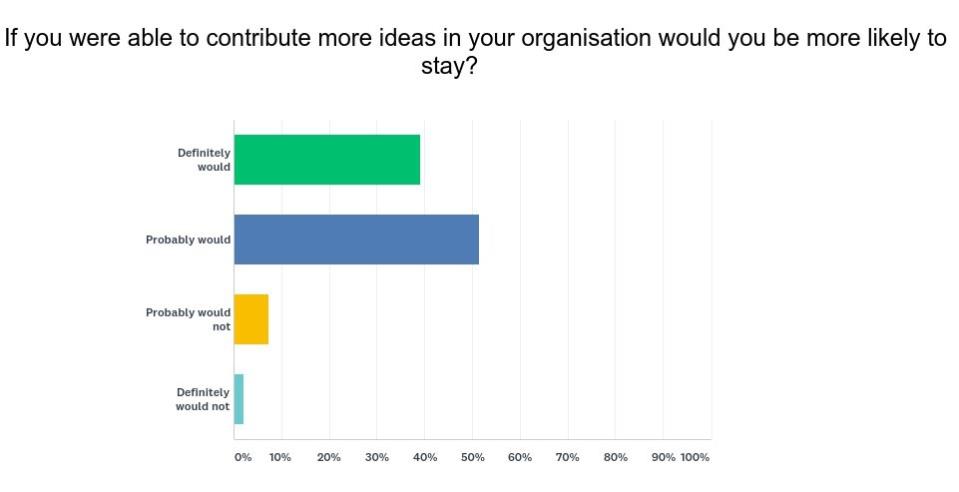The one thing bosses can do to keep their staff

What would it take to keep a disengaged employee to stay?
When it comes down to it, workers just want their voices to be heard.
A stunning 90 per cent of employees would stay at their organisation if they were allowed to contribute more ideas – and they want management support in testing ideas too, according to a survey conducted by idea-sharing platform IdeaSpies.
“Many [respondents] were annoyed when time was spent developing an idea and either they weren’t empowered to test it, or they received no feedback on why it wouldn’t be accepted,” said IdeaSpies chief Lynn Wood.

And workers aren’t lacking ideas to put forward: 76 per cent of employees said they could contribute more useful ideas than they do now.
But the main reason stopping them is lack of interest from their boss, followed by time constraints.
There are different expectations between those who want to give ideas and those who want to receive them, Wood noted in her report.
“Givers expect ideas to be implemented, while receivers may just be seeking information,” she said.
“This mismatch can lead employees to overestimate the likelihood that their advice will be taken.”
The unfortunate consequence is that employees become disheartened and disillusioned – and less likely to pitch their ideas in the future.
The cost of failing to innovate
Employees are the ones on the frontline interacting with customers and coming into direct contact with where the challenges and opportunities exist for the business.
“76 per cent said they could contribute more useful ideas than they do now, especially those who are 26-35 years old (89 per cent),” Wood said.
“Younger people and those in lower level positions find it most difficult to get their ideas up the line and these are the people who are often facing the customer and aware of new trends.”
So well-intentioned bosses could drive great employees away, which would result in driving business away.
“Leaders often don’t recognise that their employees are the best source of innovation and
could contribute many more ideas than they do now.
“Losing employees who want to contribute more would be a significant cost to these organisations.”
However, there seems to be a price on younger employees’ engagement: nearly 90 per cent of employees aged 18-35 said they’d contribute many more ideas if there were incentives to do so.
Make your money work with Yahoo Finance’s daily newsletter. Sign up here and stay on top of the latest money, news and tech news.
Now read: 10 Aussie jobs set for the highest employment growth by 2023
Now read: A fat paycheck isn’t enough for new graduates; they want this instead
Now read: The coaching sessions critical to my success: PayPal Australia MD

 Yahoo Finance
Yahoo Finance 
